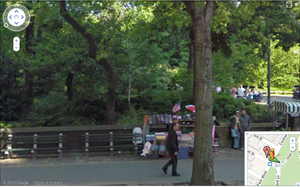In a reaction to Google's wardriving, I'm thinking of setting up a website to facilitate a mass swap-meet for people to exchange their wi-fi routers.
Google stepped a bit over the line (again) this week. This time, it was focused around a new effort to make it easier to geo-locate a web browser's location.
 As they've been driving around in those cute cars taking images for the google maps Street View tool, they have also been mapping the identifying information of every available 802.11 wireless access point (wi-fi) and storing that information along with longitude and latitude information. I'm not sure how I feel about the image street views has of me walking down Central Park West after a meeting, but the idea that they have locative information on my wireless access point definitely upsets me.
As they've been driving around in those cute cars taking images for the google maps Street View tool, they have also been mapping the identifying information of every available 802.11 wireless access point (wi-fi) and storing that information along with longitude and latitude information. I'm not sure how I feel about the image street views has of me walking down Central Park West after a meeting, but the idea that they have locative information on my wireless access point definitely upsets me.
Having been helping the folks at Open Greenmap with technology planning and development, I understand the desire to map this information. Most cellular devices (phones, iPhones, androids, etc.) are able to report their GPS coordinates when they request data from a web server. This allows for a site like Opengreenmap.org to give a mobile devices information on interesting places in proximity to where the user is at that time (that's a hypothetical, opengreenmap.org will be able to do this soon). This is not possible for people using laptops (or desktops) connected to the net via a wired network or a wifi access point. Someone looking for interesting green locations from a coffee shop has to go through a few more steps to search the maps.
Firefox has functionality for Location Aware Browsing, but without gps coordinates it's rather useless. Hats off to the folks at Mozilla who decided that these features would be off by default, requiring a user to intentionally enable this feature.
The Firefox FAQ says
If you consent, Firefox gathers information about nearby wireless access points and your computer’s IP address. Then Firefox sends this information to the default geolocation service provider, Google Location Services, to get an estimate of your location. That location estimate is then shared with the requesting website.
Google, in an attempt to better support this feature, decided that by having a wifi access point turned on, that you have opted-in to their efforts to provide Firefox with location information. That's a big assumption.
That would be enough to generate a lot of ill-will, but they went a step further -- actually capturing data being transferred over public/non-encrypted access points. This has angered some European Governments and will probably result in some heavy fines.
It serves as a healthy reminder that we should all strive to not use plain-text data transfer protocols, we should try to use encrypted options as often as possible. For my non-techie friends who are looking at the last sentence thinking "there he goes again, talking gibberish," what I'm saying is that if you use web based email, make sure the address starts with https instead of http, if you use some form of instant messaging, see if your program supports encrypted or OTR chats.
But, I want to do more than just advocate people exercise proper data hygiene, I want to muck with google and the accuracy of their data. I figure if I can setup a site where people can swap their router with someone else that has the same model in similar condition, and enough people followed through, we could render google's wardrive harmless.
Anyone want to help?



Good plan...
It's a nice idea, but if only a small number of the people owning wireless routers in your city do that, I don't think it will have much effect. It's easy to imagine a self-healing algorithm which deals with the occasional router being moved by checking that data point against all the others in range. I hear Apple's being running such a network for years (to sell iphone location data to advertisers).
yeah, but it's fun to think about
you're probably right, without a large percentage of routers being swapped, it would be ineffectual, and getting to that level of participation would take the resources of someone like... uh... google.
Unfortunately
My router's MAC address is masquerading already and the only way I can get it to work with OptimumOnline is to mask with the one MAC that works.
Also ... I used to have a router that emitted a very very high pitched hum. I don't want that router back.